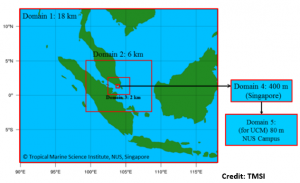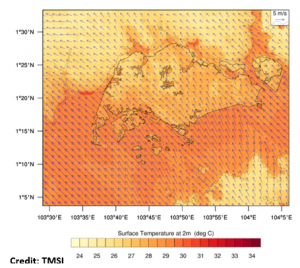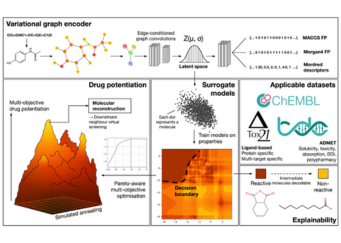Using NSCC’s supercomputing resources, researchers in Singapore are using complex computer models to look at how climate and weather impact the region
 The latest climate projections from the Fifth Assessment Report of the Intergovernmental Panel on Climate Change suggests that global models are still far from reasonable representations of climate features on regional scales, despite improvements in the spatial resolutions of the models and in the understanding of physical processes. This also indicates that downscaling the global models to higher spatial resolutions is still an active area of research in the years to come.
The latest climate projections from the Fifth Assessment Report of the Intergovernmental Panel on Climate Change suggests that global models are still far from reasonable representations of climate features on regional scales, despite improvements in the spatial resolutions of the models and in the understanding of physical processes. This also indicates that downscaling the global models to higher spatial resolutions is still an active area of research in the years to come.
Southeast Asia is a relatively under-studied region when it comes to climate sciences and studying Singapore’s climate and its change is challenging given the geographical size of the country. Therefore, supercomputers have become an essential tool for climate change study and weather forecasting due to the large quantity of data required to perform climate simulations.
Dr. Nguyen Ngoc Son, Principal Investigator, and Dr. Sri Raghavan, Head, at the Climate and Water Research cluster, Tropical Marine Science Institute (TMSI) at NUS, have been making use of NSCC’s supercomputing resources to model the weather and climate at high resolutions for impact research on urban climates, numerical weather prediction (weather forecasts), haze and climate change, thus bringing tangible benefits to weather and climate research in Singapore.
To provide more accurate local weather forecasts, the team performs weather forecasts, which are complex in dynamics, on NSCC’s high performance computer. “With spatial resolutions increasing, faster turn time for the release of timely forecasts is necessary, given these forecasts are issued four times a day. The computations need to be scaled down from global spatial scales to local (city/urban) scales. NSCC’s resources are indispensable in terms of both speed of simulations and the facility available to store massive volumes (several GBs) of data,” said Dr. Sri.
 Dr. Nguyen and Dr. Sri also perform climate integrations on multi-decadal time scales over Southeast Asia and over a Greater Singapore region. These multiple integrations are performed under different climate ‘scenarios’ to better understand future changes in the climate. “This task requires millions of CPU hours for computation which is impossible to achieve without the help of HPC. At high resolutions, the task is even more challenging. Apart from the needed high speed in model computations, the data storage volumes are in the ranges of several TBs which can only be provided by NSCC’s HPC resources,” said Dr. Sri.
Dr. Nguyen and Dr. Sri also perform climate integrations on multi-decadal time scales over Southeast Asia and over a Greater Singapore region. These multiple integrations are performed under different climate ‘scenarios’ to better understand future changes in the climate. “This task requires millions of CPU hours for computation which is impossible to achieve without the help of HPC. At high resolutions, the task is even more challenging. Apart from the needed high speed in model computations, the data storage volumes are in the ranges of several TBs which can only be provided by NSCC’s HPC resources,” said Dr. Sri.
The Climate and Water Research cluster specialises in high resolution weather and climate modelling. While weather simulations (numerical weather predictions) are undertaken at spatial resolutions of 400 m over the entire Singapore, the team also perform regional climate simulations over Southeast Asia at about 8-10 km resolutions and microscale simulations at about 80 m spatial resolutions. The applications of these different scales of simulations range from everyday weather forecasts to investigations of regional climate change impacts. More information on these studies are available from: http://www.tmsi.nus.edu.sg/weather/index.php
To find out more about the NSCC’s HPC resources and how you can tap on them, please contact [email protected].
NSCC NewsBytes September 2020
Other Case Studies
Using Digital Twin Technology to Optimise the Industrial 3D Printing Process
Researchers from the Institute of High-Performance Computing (IHPC) are utilizing supercomputers to create a digital twin that furnishes users with comprehensive information...
Accelerating electric vehicles research through HPC
Researchers from A*STAR IHPC leverage supercomputing resources to improve the performance of lithium-ion battery technology With the ever-increasing demand in energy storage...
Advancing Drug Discovery Research using NSCC HPC resources
Researchers from Nanyang Technological University (NTU) are applying variational graph encoders as an effective generalist algorithm in computer-aided drug design (CADD)....


